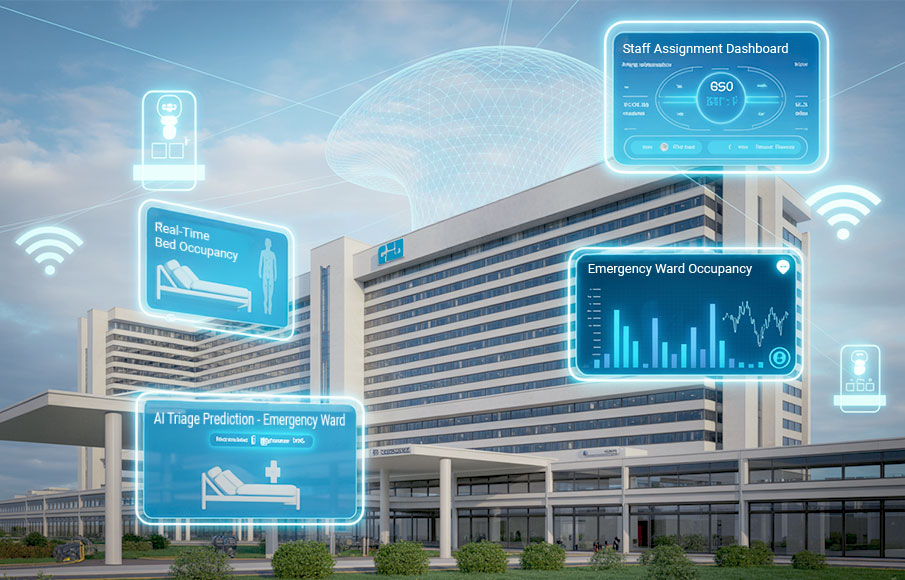4 Fleet Management Best Practices for Logistics & Supply Chain
- 18 April 2024

Efficient fleet management is fundamental to the success of businesses that rely on logistics and supply chains. A well-managed fleet ensures that goods are delivered on time, expenses are controlled, and vehicle downtime is minimised. To maintain a competitive edge in the market, organisations must focus on strategies that optimise their fleet’s performance.
The Rising Importance of Fleet Management in the Digital Age

As ecommerce flourishes, expectations for delivery services increases accordingly. Customers expect faster, timely and more efficient service, and this digital transformation has elevated fleet management into a critical business function. To stay ahead of the competition, harnessing digital technology, such as IoT, can help a fleet manager to enhance operational performance. To achieve this, there are various proven best practices that can be further improved with technology for remarkable advancement in a fleet’s operational capabilities.
4 Key Best Practices in Fleet Management
Each of these practices plays a crucial role in maintaining an efficient, cost-effective, and safe fleet operation. Fleet Managers can enhance the productivity and profitability of their operations by combining these strategies:
1. Regular Fleet Maintenance and Repair

Routine servicing and repair is fundamental to ensuring a fleet stays in optimal condition. A regular servicing schedule ensures vehicles are not only compliant with safety regulations but also operate at peak performance, minimising the chance of unexpected breakdowns.
A well-tracked maintenance schedule should be developed, detailing:
- Frequency of inspections
- Service intervals
- Individual vehicle needs
Implementing Internet of Things (IoT) solutions can greatly improve this process by enabling preventive instead of just scheduled maintenance. IoT-enabled devices are capable of alerting managers to potential issues before they escalate. Sensors can be used to monitor the temperature and vibration of the fleet’s engine, or even tire pressure, for example, to determine if maintenance work needs to be done. This allows for just-in-time repairs that reduce the likelihood of breakdowns and malfunctions without having to rely solely on a schedule. Fleet managers can now reduce downtime, lower repair costs, and prolong the service life of the fleet, reinforcing the fleet’s reliability and cost-effectiveness.
SPTel is an IoT-as-a-Service platform provider that offers a subscription-based model for IoT solutions. By providing a protocol agnostic platform, SPTel is able to help companies gain the benefits of IoT without needing to invest in set-up, deployment, and system integration.
2. Strategic Cost Management And Tracking

Managing a vehicle fleet involves careful monitoring of expenses to achieve cost-efficiency. Strategic cost management and tracking is a best practice that ensures resources are utilised wisely, and operational expenses are kept under control.
One example involves monitoring the efficient use of fuel, whether it’s optimising consumption or effectively tracking its usage. As rising fuel costs continue to balloon expenses in transport-related industries, being able to reduce fuel wastage can greatly improve a business’ sustainability
IoT has become a major part of fuel conservation in recent years. Through the use of IoT sensors for real-time data collection on routing, fleet managers gain increased asset visibility and access to crucial data, such as driving patterns, fuel usage, and engine efficiency. From this data, actionable steps such as optimised routing and can be carried out to optimise fuel use. For example, fleet managers will be able to identify the closest vehicles to pick up points. They can also identify idle vehicles and cross check against delivery volume for the day to determine if they would like to recall these vehicles to HQ or re-purpose them for other jobs.
To transmit such data seamlessly, Multi-Network SIMs can be used to power Machine-to-machine (M2M) communication. SPTel’s Multi-Network SIM is a connectivity solution supported by multiple networks, both locally and globally, to keep your vehicles connected at all times, no matter where they may be.
Another effective method of cost management is the utilisation of IoT data management solutions that SPTel can power. These systems capture a vast array of data points in real-time, offering fleet managers insights into fuel usage, maintenance requirements, and ongoing operational efficiency. Managers can fine-tune their fleet strategies to conserve expenditures while maintaining performance.
By following this best practice, fleet operators have the power to exert control over their resource usage and create more cost-effective operations.
3. Ensuring Safety and Compliance through Advanced Technologies

Safety and compliance are paramount in fleet management. Companies need to be accountable to stakeholders and maintain high safety standards. Initiatives such as structured training programmes and regular monitoring are integral to maintaining this level of safety.
The deployment of IoT devices across a vehicle fleet can revolutionise how managers monitor and enforce safety standards. Real-time data from these devices offers insights into:
- Vehicle performance: Identifying potential mechanical issues before they lead to breakdowns or accidents.
- Driver behaviour: Observing and coaching drivers to maintain safe practices.
IoT connectivity solutions, such as the Multi-Network SIM provided by SPTel, ensure that the data transmission between vehicles and the fleet management dashboard remains consistent and reliable. This stability is critical for:
- Real-time Tracking: Maintaining awareness of every vehicle’s status ensures quick response in emergencies.
- Coaching and Training: To monitor driving behaviour and patterns to quickly identify if drivers are not adhering to safe driving standards and rectify behaviours before they become a road hazard.
- Regulatory Adherence: Swiftly addressing mechanical issues within the fleet to adhere to compliance regulations and avoid any legal issues.
Leveraging IoT sensors and real-time monitoring platforms lays the groundwork for a safety-conscious work environment.
4. Enhancing Fleet Operations with GPS and Telematics

Integrating GPS and telematics into fleet management systems has become crucial for the modernisation of fleet operations. These technologies provide real-time insights into vehicle locations and driving patterns.
GPS technology enables fleet managers to be aware of vehicle locations in real-time, ensuring precise information that aids in route optimisation and can significantly reduce response times in customer service.
In order to maintain this connectivity, fleets can utilise Multi-network SIM cards to ensure uninterrupted communication and data transfer, regardless of the vehicle’s location. Multi-network SIM cards automatically switch between mobile networks to maintain the strongest possible signal, a feature particularly beneficial in areas with patchy coverage or when vehicles cross national borders.
This seamless connectivity is crucial for the effective utilisation of GPS and telematics data. With it, fleet managers can make informed decisions swiftly, enhancing operational efficiency and safety.
Integrating IoT and Multi-Network SIM Solutions in Fleet Management

IoT and M2M solutions hold the potential to form the backbone of an effective fleet management solution. Companies that utilise IoT-as-a-Service platforms, such as the one provided by SPTel, are able to achieve quick deployments and avoid large upfront costs, while gaining the ability to manage fleet status accurately, analyse performance data, and receive alerts on vehicle maintenance needs.
Meanwhile, M2M SIMs offer seamless data transmission, which are critical for vehicle tracking and can even support fleets that move between cities or even across borders which may rely on different telecommunication networks. This guarantees that fleet managers always have access to the data they need, helping maintain network resilience even when tracking their fleet internationally.
Companies that incorporate these technologies into their operations stand to gain greatly increased efficiency and profitability, helping to achieve a competitive edge.
The Future of Fleet Management in Logistics

These innovative fleet management practices stand at the ready to power the logistics industry. By following these best practices and utilising these digital technologies, companies are able to thrive in a rapidly evolving landscape.
To find out more, contact us today.












